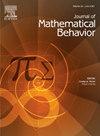Quantitative operators as an analytical tool for explaining differential equation students’ construction of new quantities during modeling
IF 1.7
Q3 EDUCATION & EDUCATIONAL RESEARCH
引用次数: 0
Abstract
Theories of quantitative reasoning have taken precedence as an analytical tool to interpret and describe students’ mathematical reasonings, especially as students engage in mathematical modeling tasks. These theories are particularly useful to describe how students construct new quantities as they model. However, while using this lens to analyze Differential Equations students’ construction of mathematical models of dynamic situations, we found cases of quantity construction that were not fully characterized by extant concepts. In this theory-building paper, we present five examples of such cases. Additionally, we introduce a new construct—quantitative operators—as an extended analytical tool to characterize those cases. Our findings suggest that quantitative operators may be viewed as an extension for theories of quantity construction and complementary to symbolic forms, when localizing theories of quantity construction for mathematical modeling, especially at the undergraduate differential equation level.
数量运算符是解释微分方程学生在建模过程中构建新数量的分析工具
定量推理理论作为一种分析工具,在解释和描述学生的数学推理,特别是学生参与 数学建模任务时,已占据了主导地位。这些理论对于描述学生如何在建模过程中构建新的数量特别有用。然而,在使用这一视角分析微分方程学生构建动态情境数学模型的过程中,我们发现了一些量的构建并没有完全被现有的概念所描述。在这篇理论构建论文中,我们介绍了五个此类案例。此外,我们还引入了一个新的概念--定量算子--作为一种扩展的分析工具来描述这些案例。我们的研究结果表明,在对数学建模的数量构造理论进行本地化时,尤其是在本科生微分方程层面,数量算子可被视为数量构造理论的扩展和符号形式的补充。
本文章由计算机程序翻译,如有差异,请以英文原文为准。
求助全文
约1分钟内获得全文
求助全文
来源期刊

Journal of Mathematical Behavior
EDUCATION & EDUCATIONAL RESEARCH-
CiteScore
2.70
自引率
17.60%
发文量
69
期刊介绍:
The Journal of Mathematical Behavior solicits original research on the learning and teaching of mathematics. We are interested especially in basic research, research that aims to clarify, in detail and depth, how mathematical ideas develop in learners. Over three decades, our experience confirms a founding premise of this journal: that mathematical thinking, hence mathematics learning as a social enterprise, is special. It is special because mathematics is special, both logically and psychologically. Logically, through the way that mathematical ideas and methods have been built, refined and organized for centuries across a range of cultures; and psychologically, through the variety of ways people today, in many walks of life, make sense of mathematics, develop it, make it their own.
 求助内容:
求助内容: 应助结果提醒方式:
应助结果提醒方式:


